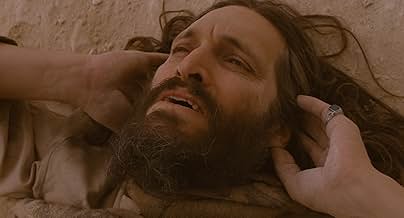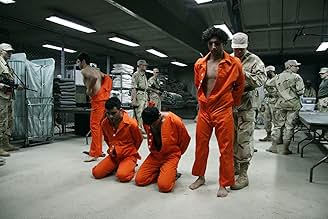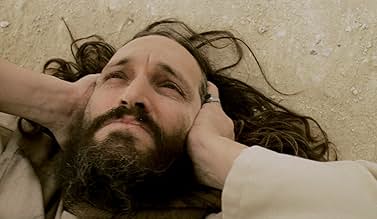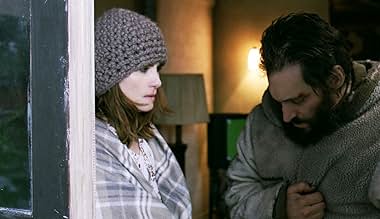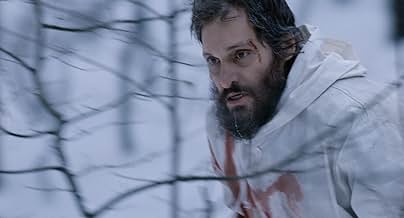VALUTAZIONE IMDb
6,1/10
8274
LA TUA VALUTAZIONE
Segui questa storia di un prigioniero di guerra afghano durante il suo tentativo di fuga.Segui questa storia di un prigioniero di guerra afghano durante il suo tentativo di fuga.Segui questa storia di un prigioniero di guerra afghano durante il suo tentativo di fuga.
- Regia
- Sceneggiatura
- Star
- Premi
- 15 vittorie e 9 candidature totali
David L. Price
- Interrogation Officer
- (as David Price)
Recensioni in evidenza
The film starts with an awesome aerial view of the desert n ends in the vast frozen woodland.
A man (Vincent Gallo) responsible for killing three US soldiers is shifted to an unknown location somewhere in Poland. He gets a chance to escape into the frozen wilderness n from this moment on our fugitive has to resort to essential killing n various other stuff to survive, including sucking milk from a lactating female. Even Takashi Mike must hav not thot about this kinda thing.
Vincent Gallo's acting is the highlight. His facial expressions speaks more than words. The director n cinematographer shud be commended for their effort.
Essential Killing begins in a desert gorge in Afghanistan, with three off duty American soldiers on a dubious, unspecified outing, possibly in search of stashed loot. Also in the gorge is an Afghan man, listed in the credits as Mohammed (an initially unrecognisable Vincent Gallo). He spies the Americans and flees to a crevice concealing a dead Afghan holding a bazooka. Who killed this man is unclear. As the Americans approach and their suspicions are aroused, Muhammad fires the weapon and obliterates them, alerting an accompanying American chopper which swoops in and quickly apprehends him.
It's best to go into the film without knowing too many details beforehand, suffice it to say that a shell-shocked Mohammed is taken for interrogation before being transferred out of Afghanistan and managing, in a scenario that will be familiar to fans of a certain film about a fugitive, to escape and flee. While this might sound, and indeed does initially appear like standard action film fodder, what distinguishes Essential Killing is the boldness of the manner in which Mohammed's subsequent experience is conveyed. The audience is slyly forced to share in his disorientation at being jolted out of his homeland. As the film progresses, it becomes clear that an individual's perception of where they are or where the path lies can change quickly.
Questions of lazy or fanciful plot contrivances, such as why a crash scene is abandoned with a prisoner still missing, or why a domesticated Border Collie opportunely appears in the middle of nowhere, are subsumed by the increasingly evident hallucinatory nature of Mohammed's journey. These hallucinations are most effective when their verisimility is left open, occasionally though they err towards overstatement. What emerges is like a fusion of The Fugitive's pulsating action with the aesthetic sensibilities of Dog Star Man and Far North. The finished article is reminiscent of the impressionistic WW2 escape film Diamonds of the Night.
While it would be impossible to consider Mohammed an innocent victim of circumstance, his brutal actions are clearly motivated by fumbling, disoriented desperation rather than malice, his violence is that of a frightened animal lashing out and grabbing what it needs to survive. Likewise, the treatment of the interrogations is admirably matter of fact. There's no hint of the sensationalism displayed in films such as Rendition and Body of Lies. Neither Mohammed nor the soldiers are allowed to descend into caricature; instead their depiction is refreshingly economical.
Essential Killing is likely to receive criticism at several levels. It forgoes any excursions into glib didacticism while telling a story from the point of view of an Afghan prisoner of war, but it also binds this protagonist with the unfamiliar companions of chase thriller tropes and art house digressions. Similar treatment in recent films such as Vinyan and Antichrist has tended to divide viewers quite sharply. Essential Killing is arguably a more measured work, although still a bold and original one. Anyone willing to take it on its own terms may find an extremely absorbing film.
It's best to go into the film without knowing too many details beforehand, suffice it to say that a shell-shocked Mohammed is taken for interrogation before being transferred out of Afghanistan and managing, in a scenario that will be familiar to fans of a certain film about a fugitive, to escape and flee. While this might sound, and indeed does initially appear like standard action film fodder, what distinguishes Essential Killing is the boldness of the manner in which Mohammed's subsequent experience is conveyed. The audience is slyly forced to share in his disorientation at being jolted out of his homeland. As the film progresses, it becomes clear that an individual's perception of where they are or where the path lies can change quickly.
Questions of lazy or fanciful plot contrivances, such as why a crash scene is abandoned with a prisoner still missing, or why a domesticated Border Collie opportunely appears in the middle of nowhere, are subsumed by the increasingly evident hallucinatory nature of Mohammed's journey. These hallucinations are most effective when their verisimility is left open, occasionally though they err towards overstatement. What emerges is like a fusion of The Fugitive's pulsating action with the aesthetic sensibilities of Dog Star Man and Far North. The finished article is reminiscent of the impressionistic WW2 escape film Diamonds of the Night.
While it would be impossible to consider Mohammed an innocent victim of circumstance, his brutal actions are clearly motivated by fumbling, disoriented desperation rather than malice, his violence is that of a frightened animal lashing out and grabbing what it needs to survive. Likewise, the treatment of the interrogations is admirably matter of fact. There's no hint of the sensationalism displayed in films such as Rendition and Body of Lies. Neither Mohammed nor the soldiers are allowed to descend into caricature; instead their depiction is refreshingly economical.
Essential Killing is likely to receive criticism at several levels. It forgoes any excursions into glib didacticism while telling a story from the point of view of an Afghan prisoner of war, but it also binds this protagonist with the unfamiliar companions of chase thriller tropes and art house digressions. Similar treatment in recent films such as Vinyan and Antichrist has tended to divide viewers quite sharply. Essential Killing is arguably a more measured work, although still a bold and original one. Anyone willing to take it on its own terms may find an extremely absorbing film.
Refreshingly unlike a lot of Hollywood's products where one is fed the director's opinion and invited to swallow it whole. Here a simple story is told without the usual, clearly identified good and bad characters. We watch a story thread its course and are invited to decide for ourselves who, if anyone, is guilty or innocent. Mahommed, the main character, could easily have been portrayed as the stereotypical Jihadist instead he is depicted as frightened and confused which one would suppose are the normal reactions to the situation he finds himself in. It is set in stark but beautiful environments and one can vividly feel the pain and deprivation which is depicted in a most understated manner. This film is different, it is in a league of its own and will be appreciated by anyone with a mind of their own - essential viewing for those who don't.
You've rarely seen a movie like Jerzy Skolimowski's "Essential Killing". Vincent Gallo (of "Buffalo '66") plays an escaped POW from Afghanistan who roams the European countryside in midwinter hoping to be able to survive in this unfamiliar setting. The absence of dialogue - except for a few lines - gives the film an especially surreal feel. There's no particular political message. The message is: when you're on your own, you'd better have your wits about you.
This is the first Skolimowski movie that I've seen. I'm impressed. I hope to be able to see more of his movies. In the mean time, I recommend this one.
Also starring Emmanuelle Seigner (Roman Polanski's wife).
This is the first Skolimowski movie that I've seen. I'm impressed. I hope to be able to see more of his movies. In the mean time, I recommend this one.
Also starring Emmanuelle Seigner (Roman Polanski's wife).
Vincent Gallo stars as a confused, lonesome Taliban fighter in this survival film, perhaps a spiritual successor to the old Nils Gaup film 'The Pathfinder' (not the remake). An unnamed fighter is captured by Americans, extradited to a base inn a Russian-speaking country, then escapes, and spends the most part of the film chased by Americans in helicopters or patrols of dogs. It's refreshing to see Americans portrayed through the eyes of a Taliban fighter; with their superior technology and almost infantile attitudes they seem quite like aliens. The fighter is ever troubled by the killing he has to do in order to survive, as he struggles through a bleak wintery landscape (shot in Norway and Poland), searching for food, clothes and shelter. This is a film about the human condition rather than a political one, in some respects it has a classic chase plot but with minimal dialogue a dream-like feel. The strangeness of it all made me intrigued; here is a Taliban fighter chased by rather alien Americans surrounded by hapless Russian-speaking farmers or foresters. This slightly unreal quality is the film's strength, also parallel to the man's sand-coloured 'dream-visions' of his homeland and imagery of a woman (whose face we never see) and images of his family.
The cinematography and use of colour contrasted against the pale winter landscape is stunning. The plot isn't entirely believable, and takes you through some pretty unlikely twists and turns, but nevertheless this is more existentialist than realist, and Vincent Gallo pulls off the non-speaking part with a humbling and convincing performance.
The cinematography and use of colour contrasted against the pale winter landscape is stunning. The plot isn't entirely believable, and takes you through some pretty unlikely twists and turns, but nevertheless this is more existentialist than realist, and Vincent Gallo pulls off the non-speaking part with a humbling and convincing performance.
Lo sapevi?
- QuizThe movie never reveals what part of the world Mohammed has been taken to. But the coordinates given by a helicopter crew, 53 39 N 25 33 E, is located in a heavily wooded area of northwest Belarus.
- BlooperAfter Mohammed falls in the water he climbs out of the lake. However, in the following scene with the dog he seems dry.
- ConnessioniFeatured in At the Movies: Venice Film Festival 2010 (2010)
- Colonne sonoreMie Toleruje - Bije
Music written by Rafal Modlinski, Karol Ludew, Piotr Leniewicz and Adam Adamczyk
Performed by Moja Adrenalina
I più visti
Accedi per valutare e creare un elenco di titoli salvati per ottenere consigli personalizzati
- How long is Essential Killing?Powered by Alexa
- Where was the taliban fighter taken to ?
Dettagli
- Data di uscita
- Paesi di origine
- Siti ufficiali
- Lingue
- Celebre anche come
- Essence
- Luoghi delle riprese
- Aziende produttrici
- Vedi altri crediti dell’azienda su IMDbPro
Botteghino
- Budget
- 3.167.000 € (previsto)
- Lordo in tutto il mondo
- 490.320 USD
- Tempo di esecuzione1 ora 23 minuti
- Colore
- Mix di suoni
- Proporzioni
- 1.85 : 1
Contribuisci a questa pagina
Suggerisci una modifica o aggiungi i contenuti mancanti

Divario superiore
By what name was Essential Killing (2010) officially released in India in English?
Rispondi


